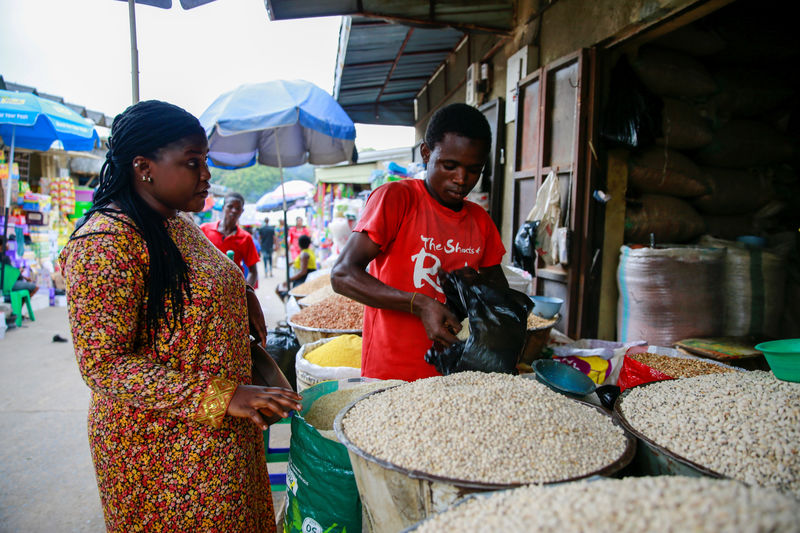Panic buying by federal government agencies, multi-nationals and merchants from neighbouring countries is partly responsible for the hike in prices of assorted foodstuff in Nigeria, Daily Trust investigation has shown.
Watchers of the agric sector told our reporters that high cost of food items such as maize, millet, guinea corn, rice, among others has dwarfed the achievements the federal government said it has recorded.
- Customs generates N1tr, seizes 2,333 goods in 6 months
- Northern youths to get agric innovation grant
Those who spoke to Daily Trust frowned at how agents of some international bodies, the Federal Ministry of Agriculture, as well as the Central Bank of Nigeria (CBN) are massively mopping up grains like maize, sorghum, millet and rice from the market.
According to them, while buying grains by the government is good as it is part of national security, they said the timing is wrong because this is rainy season.
Prices of food items have gone up, in most cases, beyond the reach of ordinary Nigerians, a situation stakeholders partly attribute to the activities of these merchants.
Our correspondents saw a copy of a contract letter dated May 26, 2021, from the Federal Ministry of Agriculture and Rural Development titled: ‘Award of Contract for the Emergency Procurement of 4,843.16MT of Maize’, which was addressed to the Managing Director, DJG Integrated Farm Limited, No 15, Tudun Wada, Dandume, Dandume LGA, Katsina State.
Another letter addressed to Zuhala Nigeria Limited, No 20, IBB Way, Kurfi General Merchant House, Flat No 4, Kano, was awarded a contract of N292, 375,982.50 under the arrangement for emergency procurement of 1,051.75MT of sorghum.
The two letters were signed by the Deputy Director, Procurement, in the ministry on behalf of the minister. One of the letters said: “I am directed to inform you that the management under the emergency situation wishes to convey the presidential approval for the emergency procurement of 4,843.16MT of maize to your company at the contract sum of N1, 380,266,697.88 only, with a delivery period of eight weeks, with effect from the date of this letter.
“You are, therefore, required to indicate in writing within three days of receipt of this letter your acceptance to the Office of Director, Procurement, Federal Ministry of Agriculture and Rural Development, Abuja, otherwise, the offer would be considered lapsed.
“Thereafter, you are to liaise with the Director (Food and Strategic Reserve) for adequate supervision of the contract and the Director (Legal Services) for the signing of the contract agreement.
“Please note that the contract is not transferable and the cost is fixed, firm and request for price variation will not be entertained.”
However, as at last weekend, investigations carried out by our reporters in Kano and Katsina states showed that the two companies are not located in the addresses provided, raising fears about the existence of the companies.
Wrong time to mop up grains
No matter the circumstances, experts believe it is wrong for any agency to be mopping up grains when the price is almost beyond the reach of ordinary Nigerians.
Emmanuel Ekong, an agricultural economist, told one of our reporters on the phone that buying of food produce by any agency should be done only during the harvest period when there was much in the market.
Ekong said, “Honestly, I can’t believe what I am hearing, how can a government ministry that is supposed to make food available be mopping up food when the citizens can no longer afford them in the market; that is ridiculous.’’
Daily Trust’s weekly market survey shows that in Kano, 100kg of maize now sells at N27, 000 as against N16, 000 last year, beans N58, 500 against N38, 000 last year, sorghum N27, 500 against N14, and 000 last year.
Similarly, at Idah, a popular grain market in Kaduna State, 100kg of rice now sells for N29, 000 against, N16, 500 same time last year, beans N61, 000, rice N68, 000 against N36, 000 and N42, 000.
We bought 12,000 tonnes only – Agric minister
Reacting to the allegations of mopping, the Minister of Agriculture and Rural Development, Alhaji Muhammad Sabo Nanono, on Wednesday, said the current rising price of grains in the market was not caused by the ministry’s purchase for the strategic reserve.
Speaking in an exclusive interview with Daily Trust, the minister said the price increase was caused by some international agencies, neighbouring countries and big players, as well as the fall in the value of the naira.
Alhaji Nanono said the ministry bought only 12,000 tonnes and suspended the purchase some weeks ago when it realised there were many buyers in the market, including the World Food Programme (WFP), ECOWAS, CBN and other buyers from the West African Sub-Region.
He said, “We bought only 12,000 tonnes and we stopped when we saw the prices were going up. How can these 12,000 tonnes affect these prices? We didn’t go directly to the market to purchase. We went to grain merchants and inspected their stores and all the grains that they had.
“Of recent, the intensity of the price increase within the last five weeks is generally caused by the naira crash. Naira has become so cheap that people from neighbouring countries: Niger, Chad, Mali and Senegal just came into the country and purchased substantial amounts of the grains which immediately sparked up the prices, especially of maize, sorghum and millet.
“Two, the major international agencies like the World Food Programme bought grains (maize, sorghum and millet) massively. Usually, they don’t buy millet, but this year they bought massively; that is the reason why the price of millet hasn’t come down. They were buying at N320, 000 per tonne. Likewise, the ECOWAS (members) are also buying, apart from the smuggling of our maize and sorghum.”
The minister further said the total intervention by the ministry was for the purchase of 100,000 tonnes of grains, which he noted was small to have any impact on the market.
He explained that “If you take into consideration our maize, sorghum, millet and cassava production, we produce nearly 16 million tonnes of maize, about 14 million tonnes of millet and 16 million tons for sorghum and 60 million tonnes of cassava. What impact will 100,000 tonnes make on this? Just look at it from that angle.”
Highlighting other contending factors, the minister said there was a lot of distortion in the market saying, “Since the COVID-19 period, people were hoarding, especially rice and maize, hoping that the prices will go up and they will sell at high prices.
“Sometimes people under the Anchor Borrower Programme (ABP) were not putting the money into production, they were using it to purchase finished products, which means they killed us in two directions: one, they denied increased production and second, they also intervened to purchase in the market.
“Also, the CBN itself is receiving grains instead of allowing the farmers to sell and pay in cash, and they take it and put it in their own stores.”
According to the Food and Agricultural Organisation (FAO), the standard food reserve for Nigeria is 3.5 million tonnes, but the minister noted that the country did not have money to buy such quantum.
CBN only mops extra harvest – Spokesman
Contacted, the Central Bank of Nigeria (CBN) said it does not buy grains from farmers but only mops up extra harvests from them.
The acting Director, Corporate Affairs, CBN, Mr Osita Nwanisobi, who responded to Daily Trust enquiries, said: “I think it is important to say that the CBN does not buy grains from farmers. What we do is that in an effort to enhance loan repayment under the anchor borrowers programme through a guaranteed market structure, the bank opted to adopt repayment in-kind (loan repayment by produce) and mopping up the extra harvest from farmers to encourage them to go back to the farm.
“This innovation has encouraged repayment and led to a strategic reserve kept with the anchors that the bank uses to moderate prices from time to time. For instance, the maize/rice farmer expects an average of four tonnes per hectare out of which about 1.6 tonnes will adequately cover the loan repayment.
“The bank mops up the balance of 2.4 tonnes per hectare through the financed anchor to offer a guaranteed market to the harvest and reduce post-harvest losses and losses due to storage. This is the concept adopted by CBN and its workability has shown in the resurgence of the grains pyramid nationwide,” he said.
We’ve no hands in mop-up exercise – Farmers
The National President of All Farmers Association of Nigeria, Architect Kabiru Ibrahim, while speaking on the recent mop-up exercise warned that it would be detrimental for any agency to be thinking of buying off grains at this particular time.
In a telephone conversation, the farmers’ leader insisted that mopping up excess produce should only be done during harvest and not during planting when prices of the grains are already up.
“How can one explain such action? It is not possible and I don’t think there is any presidential approval for such because I was invited by the office of the Chief of Staff to the President about three months ago on the issue and I told them the implications, to which they all agreed. So I don’t know where this is coming from,” he said.
Daily Trust reports that during harvest, which sometimes witnesses gluts of some farm produce, the government, through the strategic grain reserve, often buys off the excess in the market and keep it for an emergency situation.
Another large-scale farmer who does not want to be named, said, “The president must investigate some of the things that are happening. There is no way food prices would not go up when there is massive fraud in the value chain.
“All the rice, maize and whatever pyramids you saw in some states especially in the North are a fraud. Some people have collected billions of naira and diverted the money to other things that gave them a huge profit only to start moving from one market to the other at the end of the farming season to mop what is meant for the ordinary citizens.
“Also, the closure of the Nigerian borders did not help matters because merchants from as far as the Central African Republic are coming to Nigeria to buy grains. They come with few dollars and convert them to naira and go back home with a fortune. Exporting goods is good but ours is something else…We must have a rethink to save our country,” he said. He said another reason for the hike in food prices was because the government had nearly emptied most of its strategic reserve at the height of the COVID-19 pandemic.
Sources close to the reserve said out of the 100,000 metric tons available in the silos, 70,000 tons were released during the COVID-19 crisis and another five metric tons to the Poultry Farmers Association, leaving a balance of 25,000 metric tons.
By Hussein Yahaya, Vincent A. Yusuf (Abuja), Ibrahim M. Giginyu (Kano) & Idris Mahmud (Katsina)

 Join Daily Trust WhatsApp Community For Quick Access To News and Happenings Around You.
Join Daily Trust WhatsApp Community For Quick Access To News and Happenings Around You.


